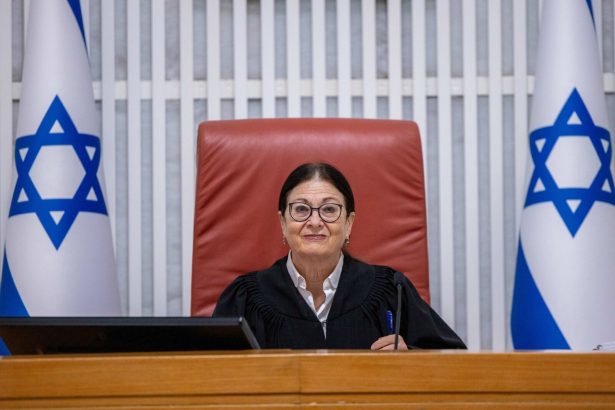Suzie Navot of the Israel Democracy Institute argued in Fathom that the judicial reforms being considered by the new government threaten Israeli democracy. Here, Russell (Avraham) Shalev, a lawyer at the Kohelet Policy Forum, argues the reforms would be a belated counter-balance to decades of judicial encroachment and heavy handedness. The reforms go to the very heart of Israeli democracy, he argues: ‘The basic question at stake is who ultimately decides. Is it Israel’s citizens, or its judges?’ Fathom positively welcome further contributions to this vitally important debate.
Israel is unique among Western democracies – it has a self-appointed judiciary that is at the same time legislator, executive as well as drafter and creator of Israel’s constitution. This enormous power functions without any effective checks, balances or supervision. As a result, reforms that have been discussed for close to three decades are coming closer to fruition.
As Israel prepares to swear in a right-wing government after almost three years of political chaos, the issue of judicial reform has become a key coalition demand. Among the proposed reforms are changes to the system of judicial appointments, clear delineation of the conditions under which the Supreme Court can void laws, and an override clause. The latter clause would allow the Knesset to pass a law overruling a Supreme Court decision striking the law down.
Israel’s legal establishment and their allies, largely on the political Left, claim that these reforms will result in the death of Israeli democracy and the end of minority rights. In truth, these reforms are essential to return a basic balance to Israel’s political system because, for decades, de facto ultimate power over almost every issue of political life has been in the hands of a self-perpetuating, unelected judicial aristocracy, running the country according not to any written law but to their own vision of the good.
The basic paradigm through which the legal establishment sees its role is that of ‘the gatekeepers’. The judges and legal advisors see themselves as the vanguard in the defence of Israeli democracy, warding off the barbarians at the gates. In this case, the barbarians are the Knesset Members and politicians, who are either actively plotting or may be easily tempted to limit or disregard basic civil liberties and human rights.
While every democratic system requires checks and balances between its branches, the gatekeeper doctrine has a pernicious and corrosive effect on Israel’s democracy. Instead of elected officials serving as representatives of the citizens, they are looked upon with suspicion and disdain. As supporters of the status-quo are fond of saying, democracy isn’t just majority rule. Democracy may not be solely majority rule, yet it is, primarily and fundamentally, majority rule. The gatekeepers, rather than serving as restraints in the most extreme circumstances, have set themselves up as alternative sovereigns to the citizens and the Knesset.
For all of the talk of checks and balances, Israel’s citizens are left with a weak Knesset and an almost omnipotent and omnipresent Supreme Court. A basic rule of democracy is that every branch much be checked and limited. These limitations already exist vis-à-vis the Knesset. Every government in Israel is composed of a coalition of multiple parties, each with their own interests and worldviews. The nature of coalition politics is one of compromise and give-and-take. Furthermore, the Knesset and executive are limited by elections and are directly responsible to Israel’s citizens, who can campaign, protest or take to the streets. Should the Knesset adopt policies that curtail the rights of Israel’s citizens, they will promptly be ejected in the next elections. This is in contrast to the Supreme Court, who are insulated from popular accountability and face no consequences for judicial legislation or policy creation.
The Supreme Court’s ever-present role in Israel’s political arena is a story (or a tragedy) told in many parts. Upon Israel’s founding, it adopted the parliamentary system originating in the UK. Contrary to the American system, the executive branch sits in and is chosen from the parliament. Similar to the UK, a principle of this system is parliamentary supremacy, meaning that the Supreme Court does not have the power of judicial review and cannot strike down legislation. The role of the Supreme Court is to resolve specific disputes between parties and to ensure that the government adheres to the law. The place for policy-decisions is the Knesset.
Until the 1980s, the Supreme Court restrained itself from involvement in certain issues, relying on the doctrine of ‘justiciability’. This doctrine meant that there were certain issues in which the court had no expertise, in which no legal parameters existed and in which judicial involvement would be inappropriate. Non-justiciable issues included policy decisions, political questions, inter-parliamentary proceedings and foreign affairs. A crucial turning point was the 1988 Ressler decision, in which the Court struck down the Defense Minister’s policy of exempting ultra-Orthodox yeshiva students from the IDF draft. The Court had previously held that the issue was a political-social question and non-justiciable. Justice Barak explained that there is no such thing as a legal vacuum and that all social questions have legal answers.
As the Court limited the use of non-justiciability, it expanded the doctrine of reasonableness. Reasonableness allowed judges to void any administrative decision they held to be unreasonable, essentially allowing judges to substitute their judgment for that of the executive branch. At the same time, the Court got rid of the requirement of ‘standing’, which meant that only parties directly affected could petition the court. This opened the door to NGOs and various ‘public petitioners’ petitioning against laws and policies that they opposed. The Court began ruling on issues as diverse as how much the government should invest in bomb shelters near the Gaza border, setting up a public inquiry into failures during the Second Lebanon War and the proper path for the Judea and Samaria security fence.
The critical stage in the Court’s ever-expanding activism came in 1992 with the passing of the ‘Human Dignity and Liberty: Basic Law’ and the ‘Freedom of Occupation: Basic Law’. These were the first Basic Laws (laws intended to serve as the basis of Israel’s future constitution) enshrining human rights; previous basic laws merely set out institutional workings. Chief Justice Barak announced that a ‘Constitutional Revolution’ had occurred, that the Basic Laws had constitutional status and that these gave the court the power to strike down laws contrary to them. Just like that, Israel had a constitution, without the Knesset members, the government or the public being aware. Of course, the Basic Laws nowhere mention the power to strike down laws. For this, Barak would earn the title given to him by senior US judge Richard Posner, ‘judicial pirate’ and ‘enlightened despot’.
Three decades of judicial activism have left a fundamentally unbalanced system in which an all-powerful court faces a weak Knesset. In the famous ‘Mizrahi’ decision, Barak argued that the Basic Laws were Israel’s supreme constitutional norm and therefore justified judicial review. Yet in 2018, the Court agreed to hear a petition against the Nation-State Basic Law, despite its earlier claim that the basic laws were the highest norms. The Court has flirted with radical legal theories such as ‘the unconstitutional constitutional amendment’, that would allow the Court to decide what goes into Israel’s constitution in the first place. This is far beyond anything courts can do in Western democracies, and is a further and extreme usurpation of the Knesset’ mandate.
This judicial high-handedness engenders chronic political instability. The political issues that the Court deals with are antithetical to legal rulings and the language of right and wrong. They require compromise and concessions, the very bread and butter of parliamentary working. For example, the repeated voiding of ultra-Orthodox IDF enlistment exemption laws have not advanced ultra-Orthodox integration in any way. Relations with the ultra-Orthodox community are a major social challenge that cannot be fixed legally or judicially.
The Court’s influence goes far beyond striking down laws. At all stages of law- and decision-making, decision-makers need to ask whether the law or decision will stand the Court’s scrutiny. The government is further at a disadvantage vis-a-vis the Court due to the claim made by government legal advisors that their counsel is legally binding. The Courts have refused to allow private lawyers to represent ministers, meaning that the government is at the mercy of legal advisors, who may present views more amenable to their personal conscience.
Opponents of judicial reform often ask ‘what if the Knesset annuls democratic elections?’ Yet, the Supreme Court has come dangerously close. In 1993, the Supreme Court ruled, in the infamous Deri-Pinhasi Precedent, that the Prime Minister was obligated to fire a minister under investigation for criminal action. The Court acknowledged that there was no basis for this claim in the Government Basic Law, but that his continued service would be ‘unreasonableness that goes to the foundation of the matter’. Of course, this term of phrase is pure sophistry, with nobody besides the judges themselves able to predict or define its meaning. As legal expert, Professor Ruth Gavison warned, this precedent was ‘a dramatic step subordinating the political-official system to judicial review.’ In May 2020, the Supreme Court debated whether to apply this precedent to Netanyahu’s premiership. This was after an election, and after Netanyahu had succeeded in forming a unity government and gaining the Knesset’s confidence. In Israel, the Supreme Court is the final word on who can even serve in public office, on the basis of the amorphous ‘reasonableness and without an explicit legal basis.
Much of the domestic and international discussion of these reforms focuses on an override clause requiring 61 Knesset Members. The need for 61 out of 120 Knesset Members, so the argument goes, will allow the government to easily overrule any Supreme Court ruling. However, this ignores several important facts. In Canada, the override clause can be activated with a simple majority. In Israel, an override clause already exists in the Freedom of Occupation Basic Law (which guarantees every Israeli national or resident’s ‘right to engage in any occupation, profession or trade’), also requiring a simple majority. In Israel’s polarized political system, gaining the support of 61 Knesset Members is no simple feat. The previous Bennett-Lapid government didn’t even have a coalition of 61 members. There is almost wall-to-wall consensus on the Israeli right that requiring any sort of super-majority will turn the override clause into a dead letter. 61 is a high-enough standard; in Israel, any more is practically an impossibility.
This anomaly cannot simply be fixed by calling for judicial restraint. Israel’s Supreme Court judges are appointed by a committee composed of nine members. Five members are from the legal establishment – three Supreme Court judges and two members of the Bar Association. The other four members are elected officials. This means that the judges essentially have a veto over judicial appointments. This situation is unique in comparison to other democracies. In many countries such as the US and Canada, judges are chosen by the elected officials. In the UK, where judges are appointed by a professional committee, they have no power to disqualify laws.
The Israeli left argues that should reforms be passed, Israel’s citizens will be left with a neutered court incapable of defending their rights. This claim simply doesn’t hold water. Israel was certainly a democracy during its first 50 years before the Constitutional Revolution. Still today, the Knesset could revoke the Human Dignity Basic Law with a simple majority, disband the court and pass whatever laws it wants. This nightmare scenario is pure fear-mongering for the simple reason that Israel is a vibrant democracy with a tolerant and liberal political culture. We need only to look towards the UK and New Zealand, where the Court has no power of judicial review. These countries can hardly be characterized as anti-democratic.
After decades of dithering, the Israeli government finally has the power to restore much-needed balance to the Israeli political system. The proposed reforms are a belated counter-balance to decades of judicial encroachment and heavy handedness. The Court’s original role must be restored – ruling in concrete disputes and ensuring the rule of law. The proposed reforms go to the very heart of Israeli democracy. The basic question at stake is who ultimately decides. Is it Israel’s citizens, or its judges?





































The problem is different. The court, especially the Supreme Court, is staffed by a majority of left-wing, “progressive” judges, with the mechanism for electing judges held by the judges and the lawyers’ union. In the last 30 years, since the so-called “Aharon Barak revolution”, extreme changes have been made that created a “liberal” law, which establishes the extended legal interpretation of the law while expanding its boundaries, and giving the supreme judges the right to interpret the law in a contrary or expansive way, and to cast precedents, on which the judges add layers from trial to trial. A situation has arisen in which checks and balances have been undermined. The Knesset is limited by legislation if the court opposes her. The government hesitates to implement its policy if there are other forces opposing it. The judges, who are an unelected body, actually fulfill the powers of the government and the Knesset out of a self-confiscation where they unofficially received it trending interpretation that contradicts the spirit of basic laws